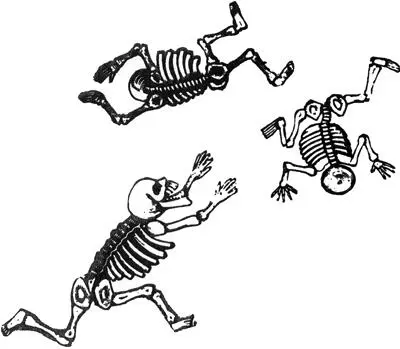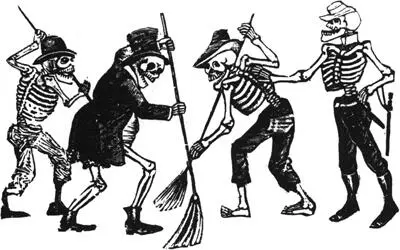In April 1997, Galdino Jesús dos Santos, an indigenous leader visiting Brasilia, was burned alive as he slept at a bus stop. Five teenagers from good families, out on the town, had sprayed him with alcohol and set him alight. They justified what they did by saying, “We thought he was a beggar.” A year later they received light prison sentences; after all, it wasn’t a case of premeditated homicide. As the spokesman for the federal district court explained, the boys used only half the fuel they were carrying, which proved they acted “with the intention of having a good time, not of killing.” The burning of beggars is a sport practiced by the youth of Brazil’s upper class with some regularity, but the news doesn’t usually reach the papers.
Leftovers: street kids, vagrants, beggars, prostitutes, transvestites, homosexuals, pickpockets, small-time thieves, drug addicts, drunks, squeegee kids. In 1993, Colombia’s “disposable kids” crawled out from under their rocks to protest. The demonstration erupted when it hit the news that “social cleansing groups” were killing beggars and selling the bodies to anatomy students at the Free University of Barranquilla. At the demonstration, storyteller Nicolás Buenaventura told those vomited up by the system the real story of the Creation: every time God created something, he had a little bit left over. While the sun and the moon, time and the world, the seas and the jungles were being born from his hand, God kept tossing the leftovers into the abyss. But God, being rather scatterbrained, forgot to make the first woman and man, and they had no choice but to make themselves. Way down there in God’s garbage dump, at the bottom of that abyss, the first woman and the first man made themselves out of God’s leftovers. We human beings were born from garbage, and that’s why we all have a bit of day and a bit of night, and we’re all time and earth and water and wind.





Fear is the raw material that sustains the flourishing industries of private security and social control, and it’s in steady supply. Demand in these industries is growing as fast as or faster than the crime rate that drives it, and experts predict that it’s going to keep on climbing. The market for private police and private jails is booming, while all of us — some more, some less — are turning into guards and prisoners: guards keeping an eye on whoever’s nearby and prisoners of fear.
TIME OF CAPTIVE JAILERS
“The TV news is our best ad,” say security salesmen, and they ought to know. In Guatemala there are 180 security firms, in Mexico 600, and in Peru 1,500. There are 3,000 in Colombia. In Canada and the United States twice as much is spent on private security as on public security. At the turn of the century there will be two million private police in the United States. In Argentina security is a billion-dollar-a-year business. Every day in Uruguay there are more homeowners who lock four locks instead of three, making some doors look like knights from the Crusades.
A Chico Buarque song starts out with the wail of a police siren: “Call the thief! Call the thief!” pleads the Brazilian singer. In Latin America the crime-control industry feeds on an incessant torrent of news about assaults, kidnappings, rapes, and other crimes. But it also relies on the poor reputation of the public police, who commit crimes with enthusiasm and pursue criminals with suspicious inefficiency. The homes of everyone who has anything to lose, however little, are already behind bars or barbed wire. And even we atheists call on God before we call the police.
In countries where the public police are more effective, alarm at the specter of crime also leads to the privatization of panic. Not only is the number of private policemen in the United States skyrocketing, but so is the number of guns on night tables and in glove compartments. The National Rifle Association, presided over by actor Charlton Heston, has nearly three million members and cites Scripture to justify bearing arms. You can’t blame its leaders for swelling with pride when they proclaim that there are 230 million firearms in the hands of U.S. citizens, an average of one weapon per soul, leaving aside babies and toddlers. In reality, this arsenal is held by a third of the population. For that third, a gun is like a lover or a credit card: without it you can’t sleep or leave home.
All over the world, fewer and fewer dogs enjoy the luxury of just being pets; ever more of them earn their bone by frightening strangers. Car alarms sell like hotcakes, and so do the little personal alarms that shriek in a woman’s handbag or a gentleman’s pocket. Same story with portable electric cattle prods, the “shockers” that knock out suspects, and with sprays that paralyze from a distance. A security company recently began marketing an elegant coat that attracts glances and repels bullets. Protect yourself and your family, counsels the Internet ad for these sporty leather cuirasses. (In Colombia, the flourishing bulletproof-vest industry sells more and more in children’s sizes.)
Let the Children Come unto Me
The sale of guns to minors is against the law in the United States, but advertising targets that clientele anyway. National Rifle Association literature sees the future of shooting sports in the hands of our grandchildren, and a pamphlet from the National Shooting Sports Foundation explains that every ten-year-old alone at home or traveling alone to the store ought to have a gun. In the New England Firearms catalog, too, children are the future of the sport.
According to statistics from the Violence Policy Center, every day in the United States, through crime, suicide, or accident, bullets kill fourteen children under the age of nineteen. The country grunts in disgust and shakes its head at the frequency with which schools are turned into battlefields. The killers are usually not black boys from the slums but white, freckled suburbanites.
Electronic monitoring via closed-circuit TV and other devices keeps an eye on things in many places. It’s undertaken by individuals and businesses, not to mention the state. In Argentina the ten thousand employees of state intelligence agencies spend two million dollars a day spying on people: they tap phones, they film, they record.
No country fails to use public security as an alibi or a pretext. Hidden cameras and microphones are placed in banks and supermarkets, offices and stadiums, and sometimes they follow people right into their bedrooms. Is there an eye hidden in the TV remote control? Ears listening from the ashtray? Billy Graham, who makes millions preaching the poverty of Jesus on TV, has acknowledged that he is careful when he talks on the phone and even when he talks to his wife in bed. “Our business isn’t to promote Big Brother,” a spokesman for the U.S. Security Industry Association insists defensively. In his prophetic novel written half a century ago, George Orwell imagined a city where Big Brother used TV to keep tabs on everyone. He called it 1984, but perhaps he didn’t get the date quite right.
Читать дальше
















